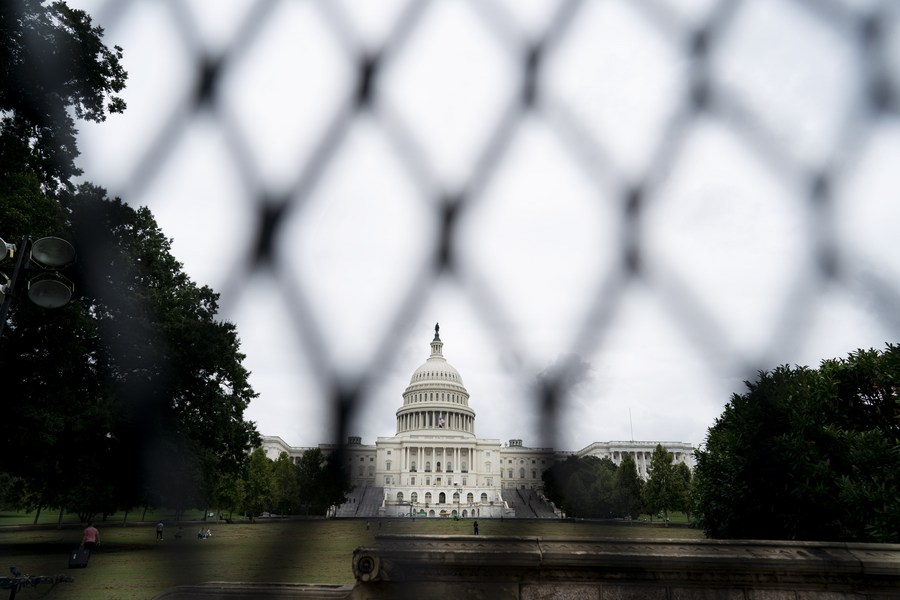
Photo taken on Sept. 17, 2021 shows the U.S. Capitol building in Washington, D.C., the United States. (Xinhua/Liu Jie)
Communication is necessary when China-U.S. relations are growing increasingly precarious. Over the last several months, the two sides have conducted a string of high-level engagements.
As part of ongoing efforts to maintain bilateral communication and stabilize relations, senior Chinese and U.S. officials held multiple rounds of meetings in Malta on Saturday and Sunday.
In the meetings, Wang Yi, Chinese foreign minister and director of the Office of the Foreign Affairs Commission of the Communist Party of China (CPC) Central Committee, and U.S. National Security Advisor Jake Sullivan agreed to maintain high-level exchanges and hold consultations on Asia-Pacific affairs, maritime affairs as well as foreign policies.
This was the second time Wang met with Sullivan in four months since their Vienna meeting in May.
The two sides conducted candid, substantive and constructive strategic communication on stabilizing and improving China-U.S. relations.
"China hopes that the relationship between China and the United States will get back on track. This is fundamental," said Su Xiaohui, deputy director and associate research fellow of the Department for American Studies at China Institute of International Studies.
"From China's perspective, we hope that China-U.S. relations will remain stable," Su said. "China has always emphasized that China and the United States should meet each other halfway to bring bilateral relations back on the right track."
Communication is necessary when China-U.S. relations are growing increasingly precarious. Over the last several months, the two sides have conducted a string of high-level engagements.
Starting with U.S. Secretary of State Antony Blinken's Beijing trip in June, several senior U.S. officials have visited China one after another, including Treasury Secretary Janet Yellen, Special Presidential Envoy for Climate John Kerry and Commerce Secretary Gina Raimondo.
All these U.S. officials have stressed the importance and willingness to stabilize China-U.S. relations. However, in areas concerning China's core interests, like the Taiwan question, the United States remains provocative.
In his meetings with Sullivan, Wang, also a member of the Political Bureau of the CPC Central Committee, emphasized that the Taiwan question is the first red line that must not be crossed in the China-U.S. relationship and the U.S. must abide by the three China-U.S. joint communiques and honor its commitment to not support "Taiwan independence."
On multiple occasions, U.S. President Joe Biden has reiterated his "five noes," namely not seek a new Cold War; not seek to change China's system; the revitalization of its alliances is not against China; not support "Taiwan independence;" and not look for conflict with China.
But these promises did not prevent Washington from boosting arms sales to Taiwan, among others.
China has decided to impose sanctions on two U.S. companies due to their involvement in arms sales to Taiwan, Foreign Ministry Spokesperson Mao Ning said Friday.
Constant hostility towards China does not serve the U.S. interests, said Anthony Scaramucci, founder of investment firm SkyBridge Capital, in a recent episode of the "Bloomberg Talks" podcast program. "So I think we need to calm ourselves down a little bit."
In recent years, the United States has adopted what it calls a "small yard, high fence" strategy in the name of protecting national security. Despite claiming it had no intention to decouple from China, the White House has continued to hammer China in the high-tech field.
In the meetings with Sullivan, Wang said China's development has strong endogenous driving force and follows inevitable historical logic and it cannot be stopped. The Chinese people's legitimate right to development cannot be deprived, he added.
U.S. sanctions that block China's access to U.S. processor chips and other technologies will slow down China's access to high-end capabilities to some extent, "but it's not going to keep China down forever," Singaporean Deputy Prime Minister Lawrence Wong said last month.
"China will still be around. America has to learn to live with China and coexist with China," said Wong. "Hopefully, the two countries will be able to find ways to manage their differences and live together."